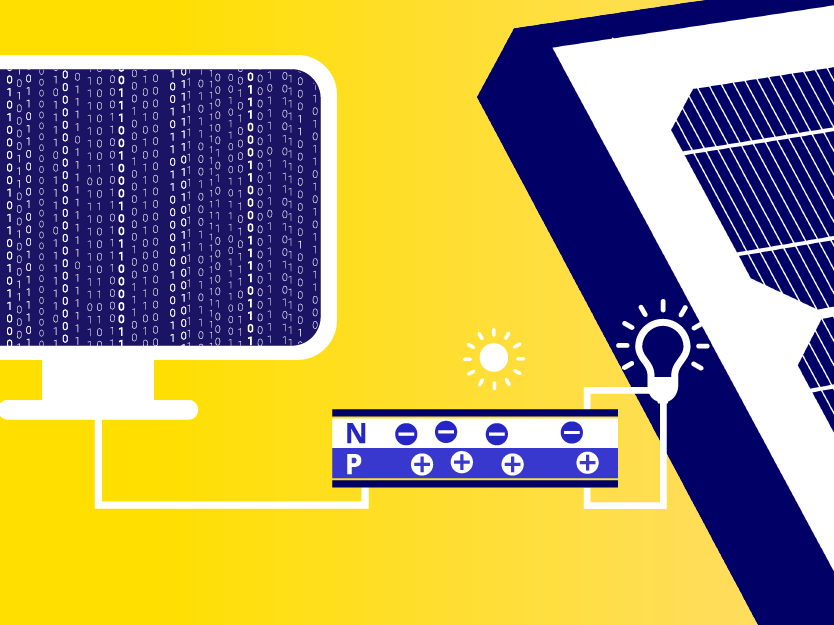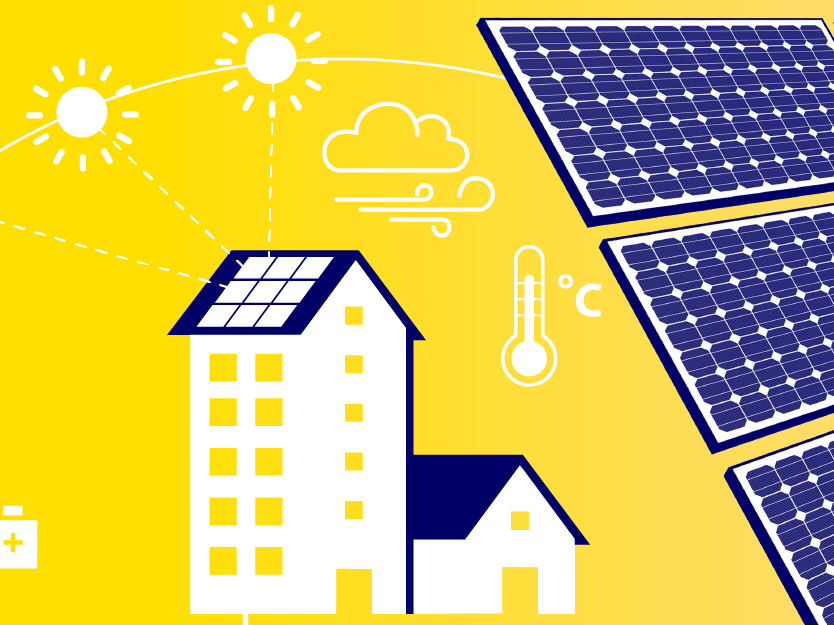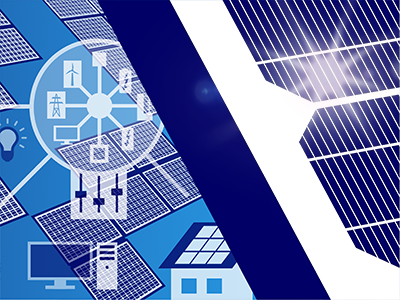Overview
Discover the characteristics and operation of the various steps required to efficiently convert the energy of photons into electricity and green hydrogen, in small and large photovoltaic systems.
Note: This course can be started until 10 June 2025, and it will be closed for all participants on 25 June 2024. Please note that all assignments should be submitted before the end date the course in order to obtain the certificate.
The coming years will see PV installations on every possible surface and terrain, and hydrogen-based storage solutions will quickly become their essential companions. Making this significant future development a reality depends on the education of skilled and capable engineers who know and understand the practical operation of small and large photovoltaic systems with all their components, and of the production of hydrogen from renewable sources. This course offers learners the chance to develop and practice such skills. They will embark on a comprehensive journey through all aspects of photovoltaic systems and green hydrogen production and utilization. These will include: photovoltaic modules in small systems with battery storage, to large grid-connected PV systems with and without hydrogen-based storage.
Through a novel web-based application, this program creates a virtual environment that simulates real-life laboratory and power plant settings. In this way, learners can acquire “hands-on” experience and will be able to combine theoretical and experimental knowledge of all the components of PV and hydrogen production systems and their design.
The program has been designed by TU Delft’s international experts in photovoltaic energy conversion, technology and systems, and is based on an on-campus laboratory course which has been run successfully for several years.
What You'll Learn
After following this program you will be able to:
- Analyze the performance of photovoltaic modules, including the effects of light intensity, module tilt, shading and season of the year
- Understand the fundamental characteristics of different PV system configurations, the effects of partial shading, and the topologies of off-grid and grid-connected PV systems.
- Recognize DC-DC buck converters and program their own maximum power point trackers
- Investigate the design and performance of a large photovoltaic power plant in different weather and operational conditions
- Construct small systems combining photovoltaic energy, hydrogen production and utilization
- Design and study the operation of a large-scale PV system with hydrogen-based storage
About the PVMD group at TU Delft
The Photovoltaic Materials and Devices (PVMD) group has more than twenty years' experience in the field of PV device characterization and modeling, as well as in researching the use of solar energy to produce green hydrogen. The group has earned its academic reputation through a significant number of publications on the topic, authored by the instructors of this online course. The group has been in direct contact with leading firms in the solar energy sector all over the world and continues to contribute to further advancement in the field. Specifically, the group contributes to the optimization of thin-film and wafer-based silicon solar cells, the development of novel concepts using nano-structured materials for future high-efficiency solar cells, the demonstration of smart modules and PV-power multi-functional building elements, and the energy yield modeling of X-Integrated PV systems.
Details
Module 1 - Small-Scale PV Systems with Electrical Storage
Discover the characteristics and operation of the various steps required to efficiently convert the energy of photons into electricity, in small photovoltaic systems.
This module provides you with practical experience with photovoltaic (PV) modules in small systems. Are you familiar with the theory of solar cells and modules, with different PV system configurations and topologies, with the behavior of different PV system components, and with the principles of operation of electronic converters and maximum power point trackers (MPPT)? Then in this module you will see – in real time – how all these characteristics and factors affect the operation of a small photovoltaic system.
Part 1: PV Module Characteristics
Characterize and explain the performance of photovoltaic modules.
In part 1 of this module, you will learn the different characteristics of PV modules in different operating conditions. You will experiment with a PV module:
- Illuminated by an artificial light source with varying intensity
- Titled at various angles in relation to the light source
- With different shading configurations
- Illuminated by a light source that simulates the position and path of the sun in different seasons.
Part 2: PV Module Configurations and Systems
The main goal of this part is to investigate and assess PV systems with different module configurations, exposed to partial shading and with different grid topologies. You will characterize the operation of a variety of small PV systems. You will carry out the following experiments:
- Connect modules in different configurations (series/parallel) and compare their performance
- Study the effect of partial shading in the presence or absence of bypass diodes
- Set up off-grid and grid-connected PV systems and analyze similarities and differences.
Part 3: Off-Grid and Grid-Connected PV Systems
Here you will analyze and understand the operation of off-grid and grid-connected PV systems and of all their components. You will investigate the performance of off-grid and grid-connected PV systems. You will also:
- Put together an off-grid PV system and study the performance when using two different charge controllers
- Build a grid-connected PV system and assess its performance and AC characteristics.
Part 4: DC-DC Converters and Maximum Power Point Trackers
You will study the operation of DC-DC buck converters and investigate the logic behind common maximum power point tracking (MPPT) algorithms. You will:
- Build a buck converter and assess its performance;
- Implement an MPPT algorithm to control the buck converter and evaluate its performance.
Module 2 - Large-Scale PV Systems with Hydrogen-Based Storage
Experience the characteristics and operation of the various steps required to efficiently convert solar energy into green hydrogen, in large photovoltaic systems.
This module provides you with practical experience with large photovoltaic (PV) systems and the production and utilization of green hydrogen. If you are familiar with the functioning of PV systems and with the principles of operation of electrolyzers and fuel cells, in this module you will see – in real time – how all these components can work together in a cohesive system and how they can be scaled up to create a large power plant.
Part 1: A Photovoltaic Power Plant
In the first part of this module, you will study the operation of a typical, large-scale photovoltaic power plant. You will look into various aspects of the design and operation of large-scale PV power plants and will:
- Design an array of PV modules that satisfy specific requirements and analyze its performance in different weather and tilt conditions
- Study the operation of a large PV system in different weather conditions across the year
- Investigate the effects of partial shading of PV arrays on the performance of a large PV system
- Look into the energy flows of a large PV system used to power industrial loads.
Part 2: Electrolyzers and Fuel Cells
Here you will analyze the performance of electrolyzers and fuel cells. You will:
- Familiarize yourself with electrolyzers and fuel cells by performing the filling and purging of the entire system
- Conduct a test-run of hydrogen production to quantify the leakage of the system
- Measure the basic electro-chemical properties of electrolyzer and fuel cell
- Characterize the performance of electrolyzer and fuel cell in storage mode.
Part 3: Green Hydrogen Production and Utilization
In this part you will study the operation of an entire system capable of producing green hydrogen with solar energy. You will investigate the performance of a system that combines a PV module, an electrolyzer and a fuel cell. You will:
- Characterize the performance of the PV module connected to the electrolyzer
- Determine the leakage of the system
- Analyze the performance of the fuel cell and of the entire system in flow mode.
Part 4: A Photovoltaic + Green Hydrogen Power Plant
Upscale gained knowledge so far to an industrial environment! In the last part of this module and the whole course, a large scale PV system will drive industrial electrolyzer and fuel cell to energize specific electric loads. You will:
- Connect and check the different connections of the plant
- Computing and monitoring the gas flow as chemical product of the plant
- Understand and monitor the power flow within the plant as function of the load profile
- Compute the loss of load probability for continuous operation of the plant
Qualifications
Certificates
If you successfully complete this course you will earn a professional education certificate and you are eligible to receive 8 Continuing Education Units (CEUs).
Chartered Engineering Competences
All our online courses and programs have been matched to the competences determined by KIVI’s Competence Structure, a common frame of reference for everyone, across all disciplines, levels and roles.
These competences apply to this course:
- A1: Extend your theoretical knowledge of new and advancing technologies.
- E3: Undertake engineering activities in a way that contributes to sustainable development and a circular economy.
Admission
To successfully complete this course, learners must know the basic operational principles of photovoltaic modules and systems, and of electrolyzers and fuel cells. The following free online courses offered by TU Delft provide ideal refresher courses for those wishing to prepare for this course:
For short introduction to hydrogen storage, please review the following two video lectures for TU Delft's MOOC Sustainable Energy:
Contact
If you have any questions about this course or the TU Delft online learning environment, please visit our Help & Support page.



